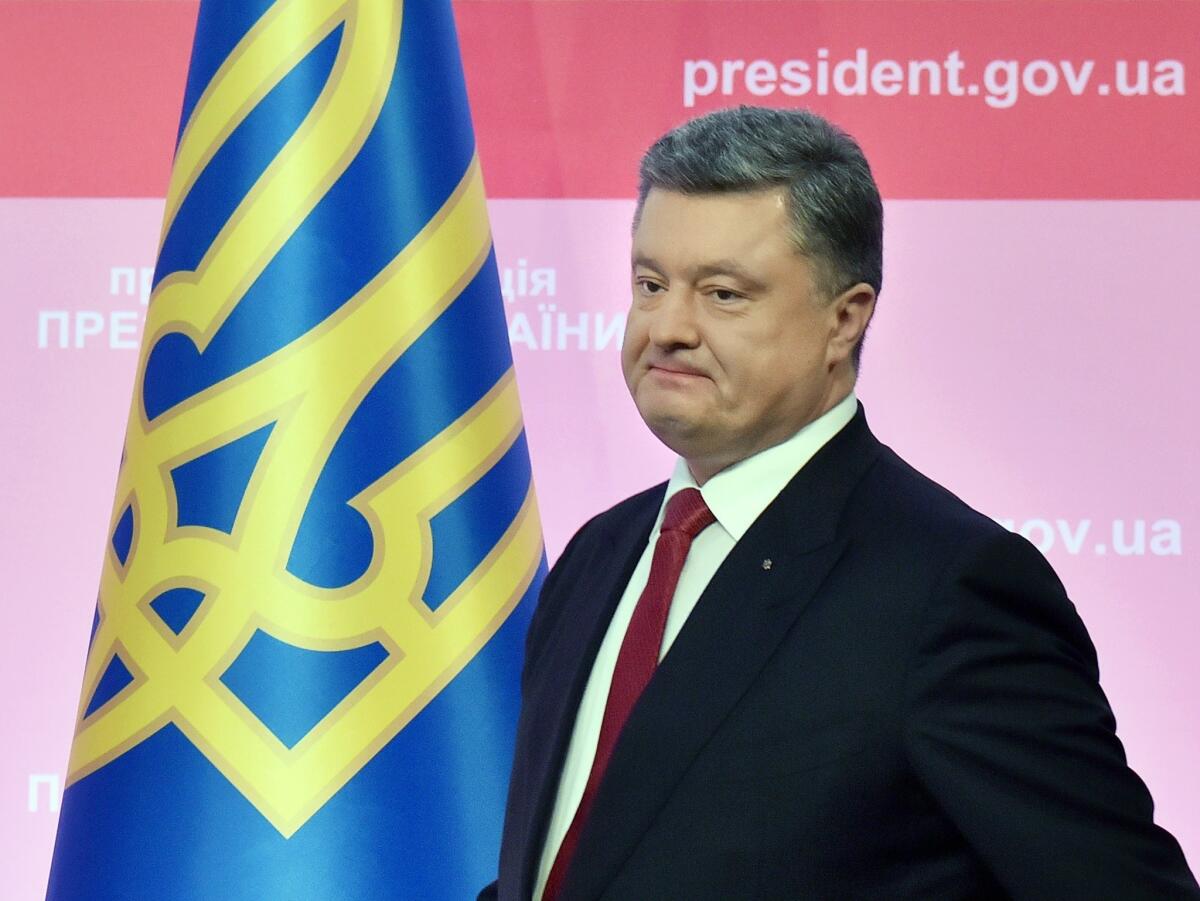No military solution to Ukraine conflict, country’s president concedes

- Share via
Ukrainian President Petro Poroshenko conceded Monday that his forces are unable to militarily defeat separatists backed by Russian mercenaries and armaments, and he called for a new attempt at negotiating an end to the fighting at an international summit on Jan. 15.
The meeting to be held in the Kazakhstan capital, Astana, will include Russian President Vladimir Putin, whom Poroshenko and his Western allies accuse of instigating the rebellion in eastern Ukraine, and the leaders of France and Germany.
President Obama has also been asked to join in the negotiations, Poroshenko said, referring to the meeting as under the “Normandy format” established on June 6, when the newly elected Ukrainian president met informally with Putin, Obama, German Chancellor Angela Merkel and French President Francois Hollande on the sidelines of the 70th anniversary commemoration of the D-Day invasion.
Though Poroshenko’s tone at a news conference in Kiev, the capital, sounded conciliatory, he reiterated that his government demands recovery of all Ukrainian territory occupied by the separatists as well as the Crimean peninsula, which Russia annexed in March.
The former chocolate magnate, who has been in office for six months, also signed into law a measure passed by the Western-oriented parliament last week renouncing Ukraine’s nonaligned status.
Russian media and officials denounced the measure that rescinds Kiev’s 2010 pledge to refrain from joining any military alliance. They said it was a provocation orchestrated by NATO that threatened to turn Ukraine into a “frontline of confrontation.” A new military doctrine adopted by the Russian Security Council and signed by Putin on Friday identified the U.S.-led North Atlantic Treaty Organization as the chief threat to Russia’s national security.
Poroshenko essentially reiterated his accusation that the Kremlin is behind the separatist violence in eastern Ukraine in saying that his cash-strapped government can neither afford to take on the Russian armed forces nor prevail in such a confrontation.
“There’s no military solution in Donbas,” the Interfax-Ukraine news agency quoted Poroshenko as saying, referring to the war zone in the heavily industrialized basin along the Don River. “If someone wants to play that way, taking up weapons and fighting the Russian military machine -- the strongest on the continent -- we’ll see how that ends.”
The Ukrainian leader’s pursuit of another diplomatic intervention follows a fruitless gathering last week in Minsk, the capital of Belarus, where Kiev government representatives and envoys from the separatists’ proclaimed People’s Republics of Donetsk and Luhansk failed to make progress toward shoring up a widely ignored Sept. 5 cease-fire.
The government and separatist leaders also conducted the largest exchange of prisoners of war last week since armed conflict broke out in April. The two sides released 368 prisoners -- 146 government troops held by the separatists and 222 captured insurgents -- on Friday. The prisoner swap was supposed to be on an “all for all” basis, but at least four government troops and three rebels promised by the opposing sides were absent from the exchange.
Kiev’s Ukrinform news agency reported Monday that at least 400 fighters from the government side remain captives of the separatists, a claim it based on the contention of Semen Semenchenko, commander of the irregular militia calling itself the Donbas Battalion.
Many of the fighters on the government side have been volunteers in units that have mostly operated outside of the Ukrainian army chain of command, often with financial backing from industrial magnates whose fortunes are at risk in the protracted conflict that has ravaged the economies of the eastern regions.
More than 4,700 people have been killed, many of them civilians, since the government moved in early April to oust the separatists from the institutions they occupied in Donetsk and Luhansk regions after Moscow annexed Crimea.
Follow @cjwilliamslat for the latest international news 24/7
More to Read
Sign up for Essential California
The most important California stories and recommendations in your inbox every morning.
You may occasionally receive promotional content from the Los Angeles Times.














